Think Positive
Generating new scientific discovery and accelerating solutions to some of today’s biggest challenges takes a team. At Triton College’s PLUS Lab, undergraduate and faculty researchers jointly plan investigations, from testing the first hypothesis to presenting the newest findings. The PLUS Lab builds on Triton’s strong history of student success, while increasing opportunities for student and faculty participation. Agencies funding student-centered research include the National Science Foundation, the National Aeronautics and Space Administration and the Department of Energy. Such research is an educational best practice and recognized by the American Association of Colleges and Universities: The goal is to involve students with actively contested questions, empirical observation, cutting-edge technologies and the sense of excitement that comes from working to answer important questions.
The Differences Between Undergraduate Research and a Standard Science Class

Undergraduate Research, Student Benefits
- Unites students and faculty across diverse disciplines by promoting engagement in scientific research under the mentorship and guidance of faculty with subject area expertise.
- Increases student access to firsthand experiences in science, technology, engineering and math (STEM), preparing them to graduate, continue their education or seek STEM-related employment.
- Engages students to solve concrete challenges using problem-based learning.
- Enhances student resumes while building transferable skills.
- Cultivates an understanding of the scientific process, including presenting original research.
Research Mentors
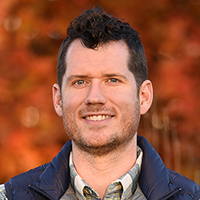
Undergraduate research is one of the most enjoyable things to work on with students because you can see their growth in knowledge and confidence most directly. It's also where I get to learn new things because students are leading the questions and we don't know what the answers will be. Taking students out into their own community to collect samples to bring back to the lab also gives everyone a sense of purpose for what we're doing and they see how their science can be used to help people.
Sheldon Turner
Chairperson, Science Department
Faculty, Geology and Environmental Science
sheldonturner@triton.edu
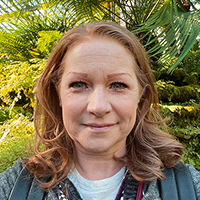
Being able to work with students on novel research projects has given me the opportunity to watch them grow as they embark on a journey of discovery. It has also been beneficial for my own professional development and afforded us the opportunity to work together to solve real-world problems.
Beth Cliffel
Faculty, Biological Sciences and Biotechnology
bethcliffel@triton.edu
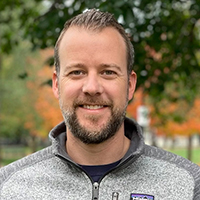
Working with students on research projects has been a great experience. I love seeing students' progress from just following directions of lab procedures in the classroom setting to developing their own questions and procedures for their own experiments. During this process, they gain a better understanding of how the process of science really works when outcomes aren't predefined as they often are in classroom experiments.
Joseph Beuchel
Faculty, Biological and Environmental Sciences
josephbeuchel@triton.edu
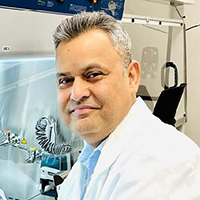
As a biologist/biochemist, I am interested in how cells and living systems work at the molecular level. A defect in normal functioning could lead to diseases such as cancer. Undergraduate students can contribute a great deal to research with two simple ingredients – curiosity and an intense desire to learn! With the right guidance, our students can contribute to knowledge that will aid in understanding disease states and possible solutions to combat them. Additionally, the research experience can enhance students' applications to professional schools and employers to the next level.
Anwar Khan
Faculty, Biological Sciences and Biotechnology
anwarkhan@triton.edu
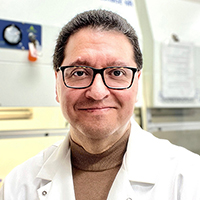
Participation in undergraduate research has been identified as one of the High Impact Practices in education by the American Association of Colleges and Universities. The PLUS Lab offers students the possibility to get involved with their professors in authentic undergraduate research in many areas of STEM, outside what they routinely do in their classroom labs. Some of my interests involve DNA barcoding of microorganisms, mainly fungi, that can be isolated from diverse environments in our area. Using the same approach, I am also interested in DNA barcoding of ancient DNA found in fossilized samples of animals and/or plants aiming to a species identification. Projects like those expose students to a wide range of skills spanning from fossil observation and manipulation to cutting-edge techniques in molecular biology for species identification. As an interdisciplinary laboratory, the PLUS Lab will be an essential component that will provide the experience value component in our college's educational value proposition.
Gabriel E. Guzman
Coordinator of the Biotechnology Laboratory Technician Program
Faculty, Microbiology
gabrielguzman@triton.edu
Let’s Discuss Your Idea
Tell us how you might use the PLUS Research Lab and what you’ll need. Research teams, faculty research advisor and students are all welcome to contact us, as is anyone with a project idea or anyone seeking to participate in a research partnership.
Current Student Projects
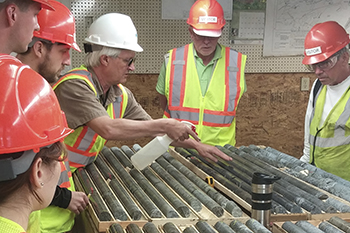
Jackson Collection – Cataloging and analyzing rock and fossils samples from more than 1,500 locations in the 48 contiguous states. Ongoing, in collaboration with the University of Hawaii and the Kansas State Geological Survey.

Anemia Research – Iron is an essential element for various physiological processes in the human body, such as oxygen transport, energy metabolism, and DNA synthesis. Maintaining iron homeostasis is crucial for overall health, as both iron deficiency and excess can lead to serious medical conditions. Ingested heme, not raw iron, is the most significant source of dietary iron for humans. Ferroportin and FLVCR are both membrane transporter proteins. Ferroportin exports iron while FLVCR exports heme. It is well established that hepcidin regulates ferroportin by causing its internalization and subsequent degradation. This project seeks to answer the question, does hepcidin regulate FLVCR like ferroportin? Techniques used to accomplish this project are mammalian cell culture, fluorescence microscopy, and possible biochemical work such as Western blotting.

Cancer Research – This project seeks to answer the question, what drug combination kills the breast cancer (and other cancer) cells most effectively. Establish kill-curves for breast cancer cell lines such as MCF-7 or MB-231 using individual drugs (trail, omacetaxine, and venetoclax). Combine these drugs in various combinations and dosages and determine the most effective one. In these experiments, mammalian cells are grown, treated with the drug formulations, and the numbers of dead and alive cells are counted. The Western blot method is used to determine the levels of intracellular proteins that are involved in apoptotic pathways.
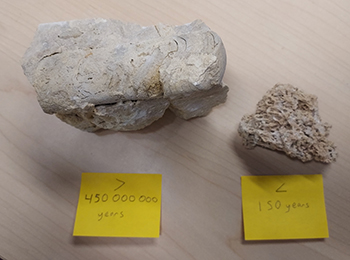
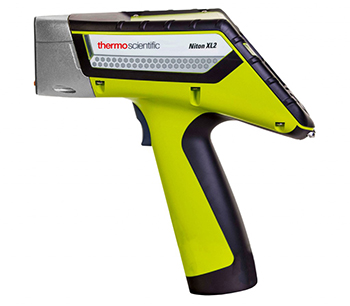
Carbonate Research – A sample of tufa (freshwater limestone) was found in an aggregate quarry in northern Illinois while fossil hunting. The quarry is mining dolomitized limestone rocks from 450 million years ago when Illinois was an equatorial shallow sea and is filled with snail, coral, trilobite, and nautiloid fossils appropriate for this time period. However, this porous tufa is precipitated around seeds from modern plants, including an invasive species only introduced to North America in the last 150 years. This project will use X-Ray Fluorescence to compare the chemical make-up of this tufa to the elemental composition of the surrounding Ordovician dolostone found in the quarry to see how it could have formed post-mining operations. DNA sequencing will be used to confirm the modern age of the tufa while study of the fossil assemblages will help confirm the ancient age of the surrounding material. Further analysis of chemical ratios between Ca, Mg, Sr and other trace elements may be able to constrain the post-industrial revolution climate impacts on the groundwater that formed the tufa.
Recent Student Projects
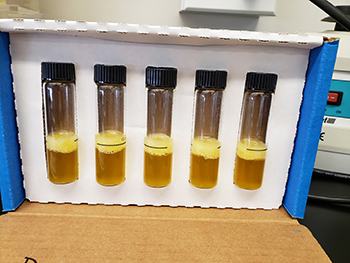
Varnish Degradation – Examining the impact of heat on varnish in paintings utilizing fiber optic spectroscopy. Awarded second and third place in Chemistry in 2019 and 2020 at the Illinois Louis Stokes Alliance for Minority Participation (ILSAMP) Conferences.
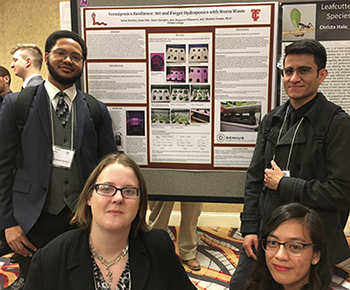
Vermiponics – Using nutrients from organic worm waste to grow vegetables indoors without synthetic fertilizers. Awarded third place in Environmental Science at the 2020 ILSAMP Conference.
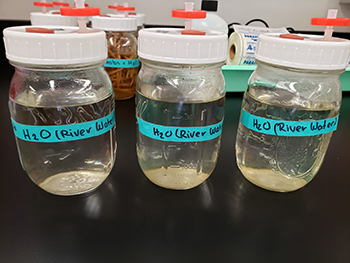
Mycoremediation – Removing pollutants and bacteria from the Des Plaines River by growing oyster mushrooms. Presented at the 2021 Northeastern Illinois University Student Research and Creative Activities Symposium.
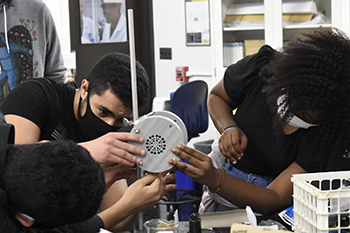
NASA MINDS (Minority University Research and Education Project Innovative New Designs for Space) – Developing new rocket fuel catalysts, and designing and testing thrusters with the support of local industry partners. Funded through a NASA grant.
